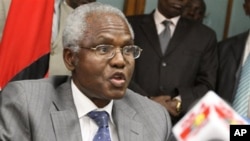The Kenyan parliament is considering a motion that would remove the country from the Rome Statute and end its obligations to the International Criminal Court.
There is a wave of discontent rising within the Kenyan legislature against Prosecutor Luis Moreno-Ocampo and the International Criminal Court.
A day after the announcement that six-prominent Kenyans are marked to face charges at The Hague, Kenya's Parliament discussed a motion that would see it withdraw its signature from the Rome Statute and disavow the authority of the international court.
The motion was put forward by Isaac Ruto, a member of Kenya's Orange Democratic Movement Party, who is seen as a close ally of suspended Higher Education Minister William Ruto, one of the suspects named by the prosecutor.
Isaac Ruto told VOA the motion had significant support in the parliament, and a member of Speaker Kenneth Marende's staff said he thought the vote could go either way.
The "Hague Six", as the suspects are being called, include three members of ODM and three members of PNU, Kenya's two leading political parties. That fact has led many politicians, including Cabinet Minister Njeru Githae to dismiss the prosecutor's cases as politically motivated. "We think Ocampo has politicized this issue. We think there is a game here being played, where some candidates are being knocked off to give room for other candidates in 2012," Githae said.
According to Article 127 of the Rome Statute a country must wait at least one-year after submitting a written request to the Secretary General of the United Nations, before leaving the court.
Proponents of withdrawal from the ICC are framing the matter as an issue of sovereignty. There has been a recent push in Kenya to establish an independent court to try the 2008 chaos suspects, and many feel a local trial would be better for the country.
Kenya tried in 2009 to establish a Truth, Justice and Reconciliation Commission to delve into the violence, but controversy surrounding the body's chairman crippled the commission, and indefinitely stalled its work.
Some within parliament believe the push for local trials is simply aimed at dodging indictment. MP Martha Karua reminded the house of the strong support for the ICC investigation with the passage of the International Crimes Act in 2008. She warned opponents, to some laughter, that they would not be able to withdraw from Kenya's legal system if indicted locally.
The motion has been delayed on procedural grounds. There is disagreement regarding whether a motion can legally repeal an international treaty.
Justice Minister Mutula Kilonzo called the motion unconstitutional. Under Kenya's new constitution, any international treaty signed previously becomes part of Kenyan Law. Some in Parliament believe it would take an amendment to the constitution withdraw from the ICC.











